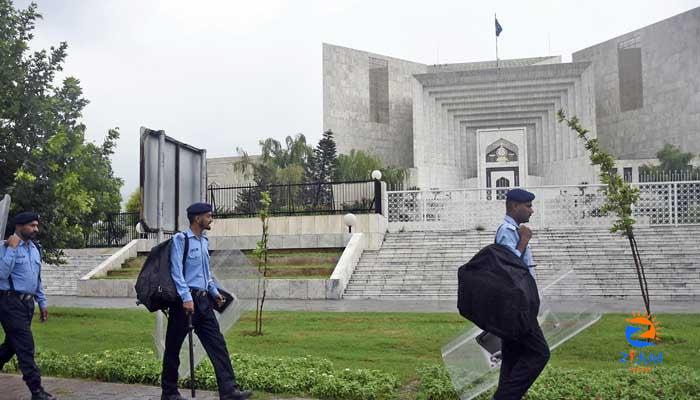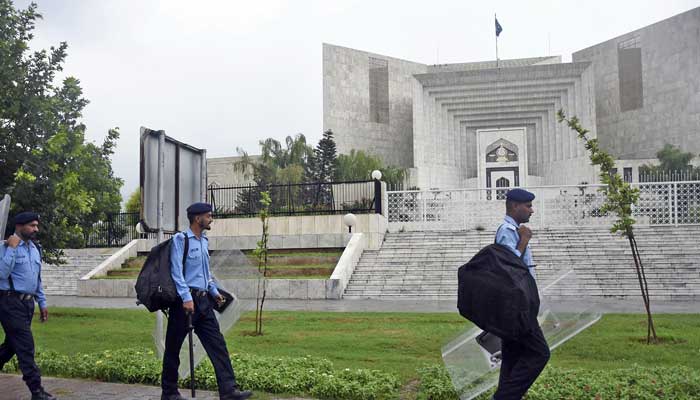
[ad_1]
As hearing for pleas against the act regulating powers of the judiciary resumed, the Chief Justice Umar Ata Bandial Tuesday emphasised that every institution is bound to adhere to the top court’s order.
“Every institution is obliged to implement the orders of the Supreme Court,” the top judge said during the hearing. CJP Bandial was leading the bench led by him on petitions challenging the Supreme Court (Practice and Procedure) Act 2023.
CJP Bandial further stressed that order issued by the judges of the Supreme Court is binding.
The National Assembly, on April 21, notified the Supreme Court (Practice and Procedure) Bill 2023 as an act.
The bill’s implementation was halted by Supreme Court’s eight-member bench headed by CJP Umar Ata Bandial.
Hearing of the petitions was conducted by an eight-member larger bench of the apex court, which is headed by Chief Justice of Pakistan (CJP) Umar Ata Bandial and comprises Justice Ijaz ul Ahsan, Justice Munib Akhtar, Justice Sayyed Mazahar Ali Akbar Naqvi, Justice Muhammad Ali Mazhar, Justice Ayesha A Malik, Justice Syed Hasan Azhar Rizvi and Justice Shahid Waheed.
At the outset of the hearing, CJP Bandial remarked that the bench will hear everyone after Attorney General for Pakistan (AGP) Mansoor Usman Awan shared that some parties in the case would like to address the bench via video link.
The top judge observed that important points, including the independence of judiciary, have been pointed out in the case and is “one of a kind”.
“Our stay order of the last hearing is in place. Law related to the Supreme Court rules are very clear,” said CJP Bandial.
He also directed all parties in the case to submit written arguments in the case.
CJP Bandial further stated that the judiciary has “reservations” over the law.
“Democracy is an important part of the Constitution and so is an independent judiciary and the federation,” the chief justice said and wondered whether the component of the judiciary can be changed.
The chief justice stressed that independence of the judiciary is a “fundamental right”.
Meanwhile, Pakistan Tehreek-e-Insaf (PTI) lawyer Khawaja Tariq Rahim said that the judicial reform bill has become part of the law.
On this point the court sought record of the debate held in the Parliament and standing committee on judicial reforms.
While the chairman of the Executive Committee of the Pakistan Bar Council (PBC) requested the inclusion of senior judges in the bench. The PBC stated that more than six references have been filed against Justice Mazahar Ali Naqvi who is part of the bench.
PBC was being represented by Hassan Raza Pasha while the AGP shared that Farooq Naek has been appointed as a counsel by the Pakistan Peoples Party, while the Pakistan Muslim League-Nawaz (PML-N) is being represented by Barrister Salahuddin Ahmed.
Notices issue
The attorney general for Pakistan (AGP), Supreme Court Bar Association and Pakistan Bar Council were issued notice on the plea.
Moreover, the country’s top court has also issued notice to nine political parties including Pakistan Muslim League Nawaz (PML-N), Pakistan Peoples Party (PPP) and Pakistan Tehreek-e-Insaf (PTI).
The top court, during the last hearing of the case on April 13, had stopped the implementation of the act observing that if the law received the assent of the president, the bill would not be acted upon in any manner till further order.
“The moment that the Bill receives the assent of the President or (as the case may be) it is deemed that such assent has been given, then from that very moment onwards and till further orders, the Act that comes into being shall not have, take or be given any effect nor be acted upon in any manner,” read the nine-page interim order issued on April 13.
In its order, the bench stated that the facts and circumstances presented here are extraordinary both in import and effect.
[ad_2]
